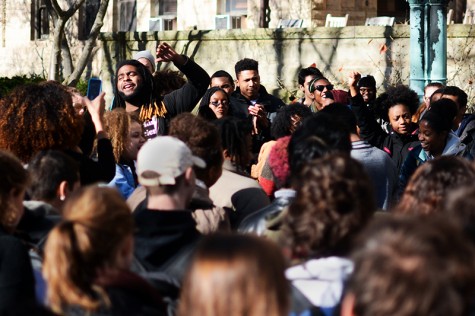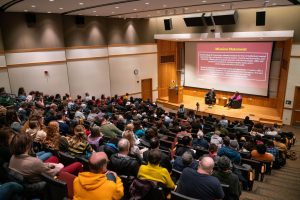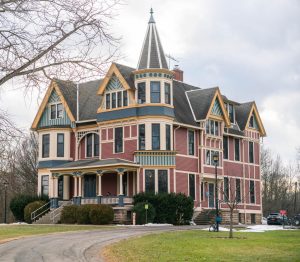Krislov Responds to ABUSUA Demands
February 5, 2016
While the list of ABUSUA student demands has attracted excessive media attention over the past eight weeks, it wasn’t until recently that College President Marvin Krislov issued an official response to the 14-page document.
In his email, which was sent to the student body Jan. 20, Krislov says the administration is taking the necessary steps to improve campus race relations, and subsequently invites all faculty and staff to join them in their efforts.

Students rally at a Black Lives Matter protest outside Wilder Hall on November 20. The demonstration addressed racism on college campuses across the country, and was held several weeks in advance of the release of the 14-page document.
“Racism and all forms of injustice hinder us from achieving our mission and must be challenged by the College wherever they undermine our goals for academic, artistic and musical excellence,” Krislov said in the email.
However, while the email expressed a sense of deep commitment on behalf of the administration, it also showed their reluctance to respond to the document as it is. In the email, Krislov says that he will not respond to the document directly because it does not allow room for “collaborative engagement.”
ABUSUA members are currently in the process of reorganizing in order to increase efficiency moving forward. Rather than having a divided front, members have committed themselves to focusing more specifically on individual issues.
Members of ABUSUA have also expressed uncertainty surrounding the administration’s true plan of action regarding their demands, as Krislov has yet to respond directly to them. The 14-page document was addressed to the Board of Trustees, President Marvin Krislov, Vice President and Dean of Studies Eric Estes and “all other appropriate governing bodies.”
An overarching concept of the demands was to give credit to Black people who helped make Oberlin College and Conservatory what it is today. The demands included renaming several buildings (e.g. the Kohl Jazz Building to the Wendell Logan Building), offering assistance for Black students on campus, more Black students in the sciences and in the Conservatory and the rehiring of local Black workers.
The second page detailed that the larger goals of the group were to see an increase of Black and POC students and faculty on campus, divestment from Israel and all prisons, safe spaces exclusively for Black people, an end to any erasure of Black contributions to the College, an end to College gentrification of the town of Oberlin, an end to hegemony in the curriculum of both the College and the Conservatory and action on the behalf of the administration.
Shortly after the demands were released and the accompanying petition was sent out over Facebook, anonymous attacks poured in from online sources. Hate speech and racial epithets, including depictions of Adolf Hitler and swastikas, flooded a Google Doc that contained over 700 signatures in support of ABUSUA’s petition before the group was forced to make the document private.
The online intimidation included threats, which were ultimately baseless, to kill Black students at the College at 3 p.m. on Thursday, Dec. 17. In response, the administration told students via email that it would increase security and inundated the campus with Safety and Security officers and members of the Oberlin Police Department. Just two weeks earlier, an unidentified person verbally assaulted students in Afrikan Heritage House. Safety and Security officers were unable to track down the trespasser, who allegedly shouted racist comments and death threats at bypassers before he left the premises.
While exams and protests were simultaneously happening in late December, the administration maintained frequent communication with students via email. The messages included information about campus security, mental health resources and access to academic support, among other items.
However, a direct response to the demands and subsequent petition was not as timely as some students had hoped. College first-year and ABUSUA member Antonio Lunn said they were irritated with the amount of time it took for President Krislov to respond, especially given the short turnover with which he responded to accusations of anti-Semitism.
“A lot of other schools have put out or are putting out demands, and their administrations are responding and enacting real change,” Lunn said. This can be seen in the case of the University of Missouri’s Concerned Student 1-9-5-0.
“However,” Lunn continued, “Oberlin’s administration has chosen to respond to obviously inaccurate anti-Semitic accusations. Saying that divesting from Israel, which has had a very large negative impact on Palestine, is anti-Semitic isn’t true. We see parallels between Israeli and Palestinian relations and anti-Blackness in America.”
Although the response itself has come under intensive criticism, the College has myriad outlets to further demonstrate the “deep commitment” the administration has to the concerns of its students.
Perhaps the most noteworthy opportunity is the upcoming final draft of the Strategic Plan, which, when published later this year, will lay the groundwork for the College’s academic and economic expenditures for the upcoming decade.
“Issues of recruitment and retention of students and faculty of color, campus climate, professional development around diversity, student support on campus, etc. are all addressed in the Strategic Plan,” Professor of Politics and Steering Committee member Chris Howell wrote in an online commentary on Krislov’s response, which was published on The Source Jan. 20.
In his response, Howell encouraged those reading Krislov’s response to turn their attention toward the upcoming Strategic Plan.
“Certainly the responses won’t go far enough for some (and will go too far for others), but it is in that document that we should be looking for the specifics of how Oberlin is responding, not President Krislov’s much shorter open letter,” Howell said.
The document has garnered over 200 responses thus far.
Moving forward, ABUSUA students will focus on collective action in the coming weeks. Before meeting with any external figures, students plan to hold a meeting to separate the demands and determine the most efficient ways to utilize the strengths of the individuals in their community.
Members say they hope the meeting will clarify the community’s desires, and that they plan to use the time to brainstorm further ideas.
Near the end of his response email, Krislov left students with a sort of call to action, encouraging all members of the institution to come together and create change.
“Achieving these goals will only be possible if we can marshal our community’s intellectual, teaching and creative skills to tackle the difficult challenges we face on our campus and in our nation,” he wrote.
Members of ABUSUA expressed similar sentiments in their call to action.
“As you will see these are not polite requests, but concrete and malleable demands,” the petition states. “Failure to meet them will result in a full and forceful response from the community you fail to support.”

























